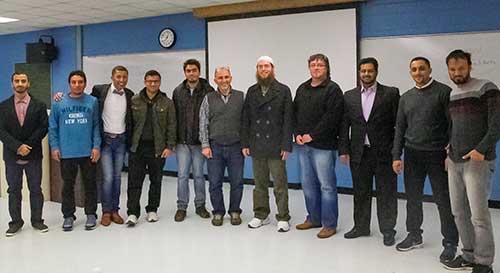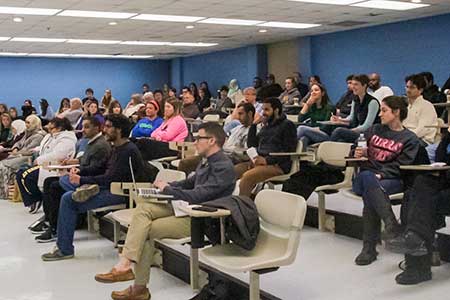
Eesaa Wood stands with members of the Muslim Student Organization after the Feb. 5 lecture.
Invited by the Muslim Student Organization, 31-year-old Eesaa Wood took the Faculty Hall lecture floor Feb. 5 in front of a crowd of about 40 people to explain Islam to non-Muslims.
Wood converted from Christianity to Islam March 13, 2009, and began studying to become an imam, or a Muslim religious leader.
“I guess it would help if you guys knew a little bit about me,” Wood said after beginning the lecture with a stream of Muslim prayers, all spoken in Arabic.
Wood, born and raised in North Carolina, comes from a long line of American war veterans and Christians. Growing up, Wood said he lived in “a kind of white-bred world.”
He went to a predominantly white church, was baptized and attended Christian camps, though he said he was never sure if they were Methodist or Baptist.
When his brother, at the time a Protestant missionary who Wood described as a “Bible-beating Fox-News-watching Christian,” left for South America, neither Wood nor his parents were expecting the news that accompanied his return.
“When my brother initially came home and told us he was Muslim my mom was not particularly happy to hear about it and physically broke dishes,” Wood said.
In her mind, his mom equated Muslims with the Twin Towers terrorist attack, Wood said.

Nearly 40 people listen to Wood’s lecture held by the Muslim Student Organization.
Almost 14 years after 9/11, the Middle East is still ravaged by fighting and news broadcasts are punctuated with reports of death and fire.
Wood said the people responsible for those atrocities are not Muslims.
He read a verse from the Quran to the audience to explain his point.
“And kill them wherever you overtake them,” reads the Quran. “And expel them from wherever they have expelled you and fitnah is worse than killing.”
There’s a lot to be said about context, Wood said. If it’s a line from a book that’s hundreds of pages long, a reader should take a minute to see what the context of the line is, he said.
“If I’m a Muslim, like what am I supposed to do with that verse?” Wood said. “Am I supposed to just jump on board and start massacring people?”
The previous verse, which Wood also read aloud to the audience, tells Muslims to fight those who fight them. Muslims believe that God, via the Quran, is telling Muslims to fight people who fight them, but don’t exceed limits, Wood said.
“Does this sound like anything we do here in America?” he said. “Does America fight people who fight it? Say for instance you’ve all kind of agreed upon a certain way of living and someone comes along and tries to disrupt that way of life. Are you going to just step back and let it happen?”
Wood said the use of violence in Islam is meant to be as a last resort, restating several times that should the other party be inclined to peace, Muslims should also be peaceful.
As an example, Wood talked about public beatings for adulterers. In 2013, Iran adjusted its law for stoning adulterers so that, in cases where stoning is not possible, other means of execution can be used. Instances like that aren’t following Quran law, Wood said. Many times, those laws are being taken out of context.
“Like fornication, for example,” he said. “The Quran states that you have to bring four just witnesses. That means you actually saw the act with your own eyes. That doesn’t mean you walked into a room and saw two naked people.”
Unless four eyewitnesses to the act itself, who are additionally considered just, can be produced, Wood said no execution can take place.
“It’s a law of deterrence,” Wood said. “Let me read you this quote: ‘Every matter which abandons justice for tyranny, mercy for cruelty, benefit for corruption and wisdom for foolishness is not part of Sharia even if it were introduced therein by interpretations.’”
Ihsan Alkhatib, professor in the College of Humanities and Fine Arts, is the faculty adviser for the Muslim Student Organization.
For him, having Wood speak was a step toward further understanding of the religion as well as Muslim students on campus.
“The students want the non-Muslim public to learn about their faith from a Muslim source and learn about it from a knowledgeable person,” Alkhatib said.
Story by Amanda Grau, News Editor